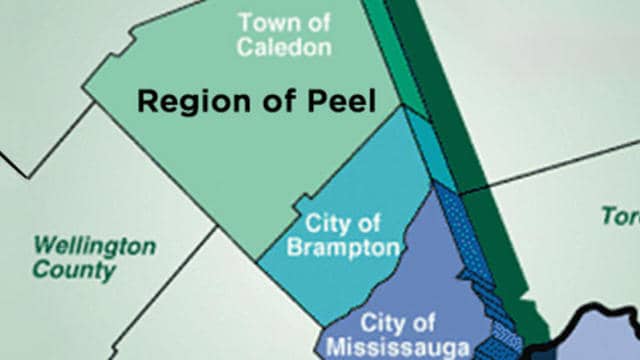Union calls out Peel Transition Board’s lack of diversity, experience and cost of splitting Mississauga, Brampton and Caledon
Published July 19, 2023 at 1:23 pm

An Ontario union is taking aim at the newly-appointed Peel Transition Board saying there are problems with diversity, worker representation, and the cost being saddled on taxpayers in Mississauga, Brampton and Caledon.
Those are just some of the laundry list of issues CUPE Ontario has with the five-person board which will guide the three municipalities through the dissolution of the Region of Peel.
The union, which represents approximately 4,000 members in Mississauga, Brampton and Caledon, said its concerns include the fact that the board is “all-white,” and no member of the board has had a career in Peel.
The province announced the selection of the five-person board earlier this month which will guide Mississauga, Brampton and Caledon through the dissolution of the Region of Peel by 2025.
Dubbed the Hazel McCallion Act, the Ontario government fast-tracked the legislation in May to begin splitting the region to let Mississauga, Brampton and Caledon stand on their own as independent municipalities.
And while the province says its five-person board brings a wide range of experience from different sectors including municipal planning, policing and law, CUPE has raised concerns about the transparency of the board’s decisions, the cost of splitting the region, a “rollback of diversity,” and more.

With a population of around 69 per cent racialized Canadians, CUPE says the transition board “fails to reflect the diversity of Peel residents” and cites a “Rollback of diversity, equity and inclusion.”
“Peel region has begun addressing these issues (e.g. Regional Diversity Roundtable, diversity strategy, reporting and data, family services) but the transition board has no mandate to prioritize or even continue the process,” reads a statement from CUPE to Insauga.com.
In response to the union’s concerns, the province told Insauga.com the board will bring “a range of experience across the public and private sectors” to the separation process.
“The transition board will help ensure fairness for all three municipalities in Peel Region, the full preservation of the frontline services residents rely on, and respect for taxpayers throughout the dissolution process,” the statement reads, adding the members “have extensive experience when it comes to working with frontline municipal employees and workforces.”
The province did not respond to CUPE’s concerns about the board’s diversity, representation, or transparency.
Appointing the transition board was the latest step on the road to dissolution, which so far hasn’t been a painless process.
The dissolution of Peel was championed by Mississauga Mayor Bonnie Crombie after taking up the torch from her predecessor McCallion, but the move has led to a sparring match between Crombie and Brampton Mayor Patrick Brown over hypothetical costs.
Mississauga, Brampton and Caledon have also been granted so-called “strong mayor” powers by the province along with dozens of other municipalities that have signed onto the Municipal Housing Pledge under Ontario’s Bill 23.
The controversial bill sets housing construction goals for municipalities across Ontario to build 1.5 million new homes within 10 years, but a report from the Region of Peel showed the bill could actually reduce the amount of affordable housing stock set to be built over the next decade.
INsauga's Editorial Standards and Policies

